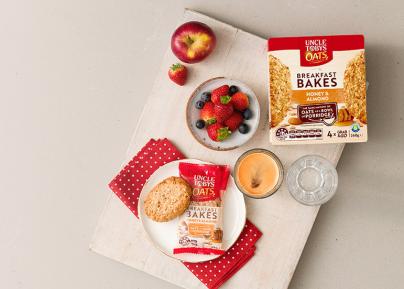Why is Breakfast Important?
As the name suggests, breakfast breaks the overnight fasting period. This is important to refuel your body and brain and replenish your energy stores. Eating a balanced breakfast can also help stabilise blood sugar and insulin levels, which in turn regulates appetite - meaning you are less likely to feel hunger pangs and cut down on unnecessary snacking later in the day (source).
For children, eating breakfast has been positively associated with brain function, cognition and academic achievement (source). Breakfast is also an opportunity to pack in many key nutrients such as fibre, calcium, protein, B-vitamins, iron and carbohydrates. We know people who eat breakfast are more likely to meet their recommended dietary intakes for fibre, vitamins and minerals compared to those who skip it (source)
What makes a balanced breakfast?
For the most nutritious start to the day, aim to choose foods from each of the five food groups (source): fruits and/or vegetables, whole grains, protein and dairy. It is generally recommended to consume at least 20% of your daily kilojoules* at breakfast. That’s about 1700kJ for many adults, or a bit less if you are a smaller eater, aiming to lose weight or planning a morning snack.
The first step is to choose quality carbohydrates, such as whole grain breads and cereals (e.g. rolled oats, whole grain breads, high-fibre UNCLE TOBYS Breakfast Bakes). These foods provide carbohydrates for a morning energy boost and nutritious fibre to help support healthy digestion.
The second step is to combine your carbohydrates with a serve of protein from foods like dairy foods, eggs, nuts and seeds or legumes. These foods help to promote satiety (feeling full) and ease blood sugar fluctuations, and also contain other nutrients like calcium, iron, B-group vitamins and healthy fats. The final step is to choose a variety of fruit or vegetables for added fibre and antioxidants to help protect the body’s cells.
Tips to get your breakfast habit started
Set the scene. Laying out breakfast bowls, cutlery, and a few choices of wholegrain cereal options on the kitchen counter the night before will save time and serve as a reminder to eat something before leaving the house. Get your kids involved in this process, too.
Stock up. Keep a steady supply of healthy whole grain breads and cereals, nuts, fresh fruit, eggs, milk or yoghurt at home or your place of work. A combination of these ingredients will up your daily fibre intake and dish up enough protein for satisfaction. Best part, they can be pre-prepared, portioned out and ready at your finger-tips.
Have a back-up plan. Not feeling hungry in the morning is one thing, but many people report a lack of time as the reason why they don’t break the morning fast. At the best of times, things don’t always go to plan, and sitting down to enjoy breakfast may not be possible. Healthy, on-the-go options can still fit the breakfast bill and be just as fulfilling. High-fibre options that are also sources of protein, such as UNCLE TOBYS Breakfast Bakes contain the same amount of wholegrain oats as a bowl of porridge (a 34g original quick sachet) and are perfect for when you are on the go. If you’re out of time, a Breakfast Bake, piece of fruit and bottle of water will do the trick and help ensure the whole family get a healthy kick start to the day.
* Percentage Daily Intakes are based on an average adult diet of 8700kJ. Your daily intakes may be higher or lower depending on your energy needs.
What type of tasty goodness are you looking for?
Search our range

